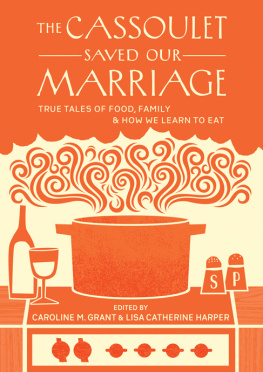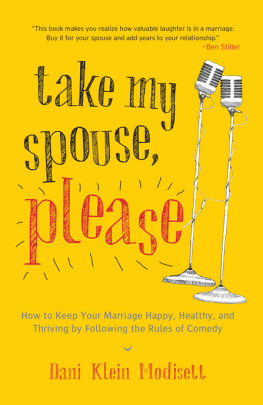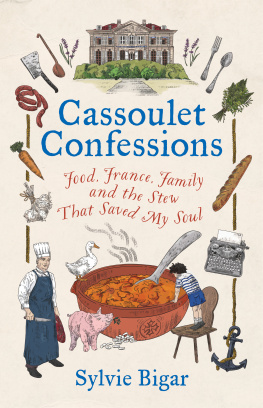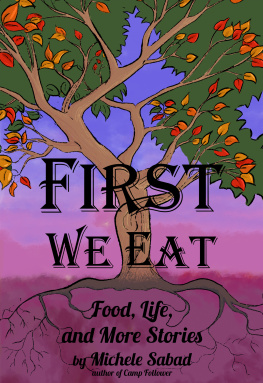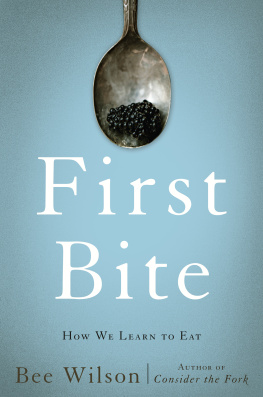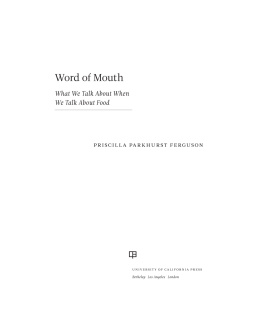A fantastic collection that is as much about relationships as it is about the food that bonds us. You will never look at your family dinner in the same way again.
Wylie Dufresne, chef and owner of Manhattans wd~50 and Alder
The Cassoulet Saved Our Marriage is a delightful collection of essays that help define the importance of food in our lives. This book made me hungry for good meals and good people. I dare you to read this book and not start planning a dinner party.
Anne Zimmerman, author of An Extravagant Hunger: The Passionate Years of M.F.K. Fisher
ABOUT THE BOOK
Food is so much more than what we eat. The Cassoulet Saved Our Marriage is an anthology of original essays about how we learn (and relearn) to eat, and how pivotal food is beyond the table. Without mantras or manifestos, twenty-nine writers serve up sharp, sweet, and candid memories; salty irreverence; and delicious original recipes. Just like you, these writers are parents, husbands, wives, children, and caregivers trying to feed their families and nourish their livespull up a chair and dig in.
With essays from:
- Keith Blanchard
- Max Brooks
- Melissa Clark
- Elizabeth Crane
- Aleksandra Crapanzano
- Gregory Dicum
- Elrena Evans
- Jeff Gordinier
- Caroline M. Grant
- Phyllis Grant
- Libby Gruner
- Lisa Catherine Harper
- Deborah Copaken Kogan and Paul Kogan
- Jen Larsen
- Edward Lewine
- Chris Malcomb
- Lisa McNamara
- Dani Klein Modisett
- Catherine Newman
- Thomas Peele
- Deesha Philyaw
- Neal Pollack
- Barbara Rushkoff
- Bethany Saltman
- K. G. Schneider
- Sarah Shey
- Stacie Stukin
- Karen Valby
CAROLINE M. GRANT is Editor-in-Chief of Literary Mama, where she also writes a monthly column, Mama at the Movies. She coedited the anthology Mama, PhD: Women Write about Motherhood and Academic Life (Rutgers, 2008). She holds a PhD in Comparative Literature from the University of California, Berkeley.
LISA CATHERINE HARPER is the author of the award-winning memoir A Double Life: Discovering Motherhood (Bison Books/University of Nebraska, 2011). Her writing has appeared in the Huffington Post; Babble; the San Francisco Chronicle; Glimmer Train; Gastronomica; Mama, PhD; Educating Tastes; and on PoetryFoundation.org. She has taught widely in the San Francisco Bay Area, most recently in the MFA program at the University of San Francisco. You can find her online at www.LisaCatherineHarper.com.
Sign up to receive free projects and special offers from Roost Books.

Or visit us online to sign up at roostbooks.com/eroost.
THE CASSOULET SAVED OUR MARRIAGE
TRUE TALES OF FOOD, FAMILY, AND HOW WE LEARN TO EAT

Edited by Caroline M. Grant & Lisa Catherine Harper

Roost Books
An imprint of Shambhala Publications, Inc.
Horticultural Hall
300 Massachusetts Avenue
Boston, Massachusetts 02115
roostbooks.com
2013 by Caroline M. Grant and Lisa Catherine Harper
Cover design by Daniel Urban-Brown
Cover art by Shutterstock/Monbi bi/GDM/Barishkina
All rights reserved. No part of this book may be reproduced in any form or by any means, electronic or mechanical, including photocopying, recording, or by any information storage and retrieval system, without permission in writing from the publisher.
Lobster Lessons first appeared in Gourmet (August 2009).
Still Life on the Half-Shell first appeared in Gastronomica: The Journal of Food and Culture (10:2).
Diligent efforts were made in every case to obtain rights from copyright holders. The efforts were not all successful. The editors and the publisher are grateful for the use of this excerpted material.
LIBRARY OF CONGRESS CATALOGING-IN-PUBLICATION DATA
The cassoulet saved our marriage: true tales of food, family, and how we learn to eat / [compiled by] Caroline M. Grant and Lisa Catherine Harper.First edition.
Pages cm
eISBN 978-0-8348-2844-5
ISBN 978-1-61180-014-2 (pbk.: alk. paper)
1. Cooking. 2. Dinners and diningSocial aspects. 3. Gastronomy. I. Grant, Caroline, 1967 II.
Harper, Lisa Catherine, 1966
TX714.C3764 2013
641.013dc23
2012026370
For Ben, Eli, Ella, and Finn, who inspired
this project, and for Tony and Kory,
who sustained us along the way.
Nothing is more interesting than that something that you eat.
GERTRUDE STEIN
CONTENTS
A child should be encouraged, not discouraged as so many are, to look atwhat he eats, and think about it.
M. F. K. FISHER
The grilled fish he ate with his father in a rustic seaside restaurant. The vinaigrette they drizzled over their soup, or the oysters they ate together the first night in their new city. The chicken Milanese her brother taught her to cook after weight-loss surgery. The cassoulet that anchored and saved their marriage.
Food is never simply about what you eat.
Since 2008, weve been writing on our blog, Learning to Eat, about how we feed our families: practical recipes for busy weeknights, special meals for celebrations, snack foods, and desserts. Weve written about holiday traditions and everyday meals, what we keep in the pantry and what we hoard in the freezer. We write about cocktails and appetizers, even junk food. But we also consider bigger questions: Does family dinner, every night, really matter? Who cooks, cleans up, and sets the table? Why is Carolines family vegetarian? Should Lisa serve meat? Where do we shop and how do we economize? What family food traditions do we maintain, which do we abandon, and how do new ones arise?
Like generations of food writers before usBrillat-Savarin, M. F. K. Fisher, Elizabeth David, Julia Childwe believe that eating is not a singular experience, nor has there ever been one right way to eat. How we eat reflects what we find important about our family, our culture, and our particular time and place in the world. Food is fundamental in our lives, but how we should eat is not necessarily obvious. How else can we explain the way our national food culture has stirred up such controversy? From foodies obsessed with sourcing the most rarefied ingredients to ordinary families putting something on the table every day, how we eat has become the subject of feverish debate and scrutiny. In the midst of these heated conversations, most of us are just trying to get our families fed. Why should we care so much? The answer is not as simple as you think.
The Cassoulet Saved Our Marriage broadens the conversation we began on our blog. In the stories and essays that follow, everyday peopleparents, professional food writers, chefs, and othersanswer a basic question for fellow everyday people: Why does family food matter? Like our blog, The Cassoulet Saved Our Marriage goes beyond the local, sustainable, organic mantra to offer an intimate look at the way real families eat. From favorite meals to the relationships forged (or broken) at our tables to the social, cultural, and ethical lessons inherent in our family traditions, this book explores the profound connection between food and family.
Next page
